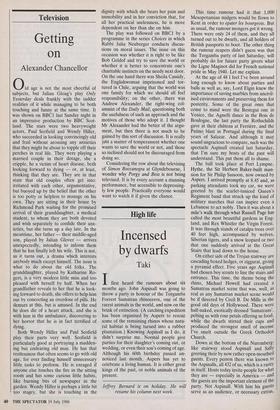Television
Getting on
Alexander Chancellor
Old age is not the most cheerful of subjects, but Julian Gloag's play Only Yesterday deals frankly with the sadder realities of it while managing to be both touching and funny at the same time. It was shown on BBC1 last Sunday night in an impressive production by BBC Scot- land. The stars were two heavyweight actors, Paul Scofield and Wendy Hiller, who succeeded in looking convincingly old and frail without arousing any anxieties that they might be about to topple off their perches in real life. They were playing a married couple in their dotage, she a cripple, he a victim of heart disease, both looking forward to dying — or, at least, thinking that they are. They are in that state that old couples often get into: irritated with each other, argumentative, but buoyed up by the belief that the other is too potty or helpless to manage on his own. They are sitting in their house by Richmond Park waiting for the promised arrival of their granddaughter, a medical student, to whom they are both devoted and wish separately to confide their anx- ieties, but she turns up a day late. In the meantime, her father — their middle-aged son, played by Julian Glover — arrives unexpectedly, intending to inform them that he has finally left his wife. This is not, as it turns out, a drama which interests anybody much except himself. The issue is what to do about the old folks. The granddaughter, played by Katharine Ro- gers, is a very modern little miss and too pleased with herself by half. When her grandfather reveals to her that he is look- ing forward to death, she offers to help him out by concocting an overdose of pills. He demurs at this, but is amused. In the end he does die of a heart attack, and she is with him in the ambulance, discovering to her horror that he is in fact terrified of dying.
Both Wendy Hiller and Paul Scofield play their parts very well. Scofield is particularly good at portraying a madden- ing but endearing old man. He has that restlessness that often seems to go with old age, for ever finding himself unnecessary little tasks to perform. He is enraged if anyone else touches the fire in the sitting room and has some curious little habits, like burning bits of newspaper in the garden. Wendy Hiller is perhaps a little bit too stagey, but she is touching in the dignity with which she bears her pain and immobility and in her conviction that, for all her practical uselessness, he is more dependent on her than she on him.
The play was followed on BBC1 by a programme in the series Choices in which Rabbi Julia Neuberger conducts discus- sions on moral issues. The issue on this occasion was whether it is right to be like Bob Geldof and try to save the world or whether it is better to concentrate one's charitable instincts on the needy next door. On the one hand there was Sheila Cassidy, the Englishwoman imprisoned and tor- tured in Chile, arguing that the world was one family for which we should all feel responsibility; on the other, there was Andrew Alexander, the right-wing col- umnist of the Daily Mail, questioning both the usefulness of such an approach and the motives of those who adopt it. I thought Mr Alexander had the better of the argu- ment, but then there is not much to be gained by this sort of discussion. It is really jttst a matter of temperament whether one wants to save the world or not, and those so inclined should not be discouraged from doing so.
Considering the row about the televising of Simon Boccanegra at Glyndebourne, I wonder why Porgy and Bess is not being televised. It is by every account a stunning performance, but accessible to depressing- ly few people. Practically everyone would want to watch it if given the chance.


















































 Previous page
Previous page